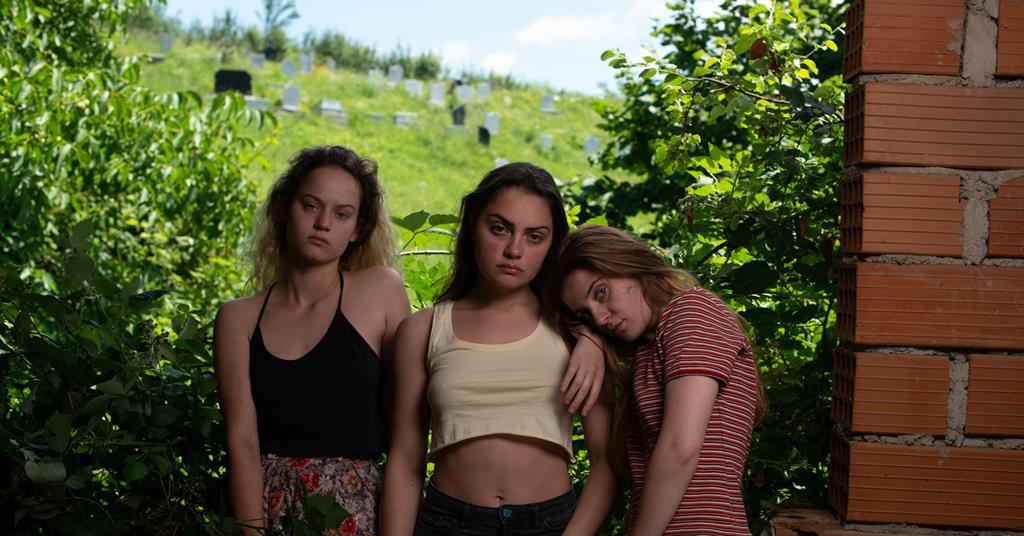Self taught, Luàna Bajrami acquired experience through her collaborations with different filmmakers while practicing writing, editing, and directing through numerous amateur short film projects. After graduating from high school, she stopped her studies and devoted herself fully to her passion. In 2019, she directed her first short film, “En été mûrissent les baies.” “The Hill Where the Lionesses Roar” marks the “Portrait of a Lady on Fire” actress’ feature directorial debut.
“The Hill Where Lionesses Roar” is screening in Directors’ Fortnight at the 2021 Cannes Film Festival. The fest is taking place July 6-17.
W&H: Describe the film for us in your own words.
LB: The film is about youth, from hope to despair. We get to know three young women struggling with their daily life, trying to break away from a future they feel is imposed on them. We follow them spending time together, bored in this small town. As there is no opportunity, they need to figure things out for themselves, bypassing the conventional path and bypassing reality — because overall, they are lionesses.
W&H: What drew you to this story?
LB: I wanted to talk about youth without any filter, without any nostalgia, and without trying to be overly stylish. However, I did not try to avoid my own filter from my experiences. I wrote the script really fast, as a necessity when I was 18. It’s still a fiction, but at some point, I felt as though I was discovering myself through the process.
I think growing up with these two cultures, French-Kosovo, gave me a different kind of insight. Young people from these two countries do not have the same opportunities, but they are dealing with the same struggles. I was writing a film about youth from a universal perspective, but I drew from some of my own experiences.
W&H: What do you want people to think about after they watch the film?
LB: I would hope people take something away, whatever that may be. I would not want to influence the audience either way. The three girls are like a symbol, maybe they will rekindle a flame in the hearts of some.
I hope the film will evoke an emotion.
W&H: What was the biggest challenge in making the film?
LB: The biggest challenge was to start, to go for it. You must convince others to believe in your project, but first you have to convince yourself. We worked hard, with a low budget. The schedule was super tight. Five months after the first draft of the script, we were on the first day of shooting. That was the first achievement.
W&H: How did you get your film funded? Share some insights into how you got the film made.
LB: Because of the schedule, we were not able to follow a typical format for the project funding as we had to start shooting as soon as possible. We knew the budget was small, and the ambition pretty big, but we never let the artistic elements suffer. Money can’t define one’s creativity and it should not limit it.
Step by step, we found partners ready to join us. And we did it.
W&H: What inspired you to become a filmmaker?
LB: From a very young age I was fascinated with cameras, pictures, films, and anything connected to cinema. The process of capturing reality on film was so interesting for me. At 10, I made my first foray into the industry as an actress. Being so young I don’t think I was so [consciously] aware — it happened pretty naturally.
I just loved being on set, talking with the director, meeting people. I learned everything during that time — but I never stopped writing. I directed many amateur short films, and then I had a vision: I was going to make a financed project.
W&H: What’s the best and worst advice you’ve received?
LB: I think the best advice was from my mum. She always said, “Art is the only place where there is no boundaries. If you feel home there, go for it.”
And the worst was something like, “Take it easy. Take your time. You’re too young to direct a feature film.”
W&H: What advice do you have for other women directors?
LB: My mum has it right, doesn’t she? Just go for it.
If we don’t say “male directors” we shouldn’t say “female directors,” but I think nowadays we are on a positive trajectory to make things change. In fact, sometimes you can face prejudice [and] use [that experience] as a strength. Being a woman doesn’t define our abilities.
W&H: Name your favorite woman-directed film and why.
LB: As I said, I am not gender bias when I watch a film. Sometimes I don’t even know the title because I like to be surprised. A film is emotive — it can be a mix of sensations and can catch you unawares depending on your mood.
W&H: How are you adjusting to life during the COVID-19 pandemic? Are you keeping creative, and if so, how?
LB: Things are slowly getting back on track. When everything stopped, it was a shock. I felt angry and disappointed. Now I think it was a great time to be creative — I wrote my second feature film during this time. It’s now in development.
W&H: The film industry has a long history of underrepresenting people of color onscreen and behind the scenes and reinforcing — and creating — negative stereotypes. What actions do you think need to be taken to make it more inclusive?
LB: I don’t know what the answer is. I think it is more a question of the filmmaking process. Let’s make this art more accessible, to be seen and to be made. Perhaps that could be the first step. There are not enough films being made comparatively to the number of stories wishing to be told.







